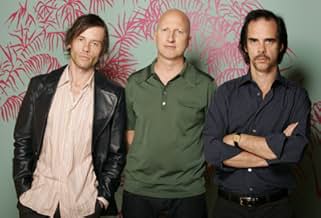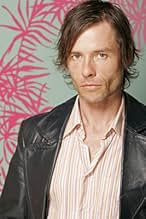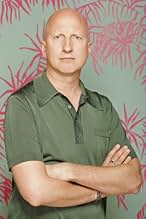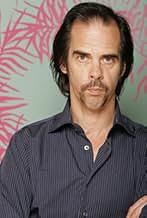The Proposition
A lawman apprehends a notorious outlaw and gives him nine days to kill his older brother, or else they'll execute his younger brother.A lawman apprehends a notorious outlaw and gives him nine days to kill his older brother, or else they'll execute his younger brother.A lawman apprehends a notorious outlaw and gives him nine days to kill his older brother, or else they'll execute his younger brother.
- Awards
- 14 wins & 30 nominations total
- Director
- Writer
- All cast & crew
- Production, box office & more at IMDbPro
Featured reviews
The plot summary and the advertising seemed to offer some form of thriller but in reality the film delivers something altogether more interesting and memorable. Set in the Australia outback where settlements are being born and laws being established, the film charts the moral complexities of the good and bad in the story while painting a beautifully bleak backdrop of open space and bloody, pointless violence. It is not an easy film to watch and certainly not one to expect to come out of laughing or feeling good about things. Nor is it a film to go into expecting a traditional plot because it is this area where the film is at its weakest because it is not a "this happened, this happened then that happened" sort of story. This is not to say it is boring but it does require patience for the casual viewer. Personally I found most scenes to be interesting but most admit that the narrative kind of hangs around rather than moving forward firmly in one direction.
The substance is more in the characters than in the narrative and on this level it was engaging. Although the posters and summary will tell you this is about the Burns brothers, it is as much if not more about Stanley and his wife. It is he would has the duality of trying to defeat violence by encouraging it while also heaving under the burden of trying to take this job entirely on his own shoulders while protecting his wife from knowing anything about the real world out in the desert. It is an interesting thread and for my money it was the thrust of the story the issue of what Charlie will do is actually part of Stanley's story rather than the other way around. With this as the story the film is much better because it does paint a convincing tale around this. The Burns brothers thread is still interesting but less is done with it with Arthur himself being very little more than an enigmatic plot device.
Style wise the film is fantastic as it delivers a bleakly convincing picture of the birth of Australia. The landscape is beautifully filmed and, although Cave could have done more as writer, his contribution to the soundtrack is as welcome as it is well used. The sudden moments of violence are uncomfortable and difficult to watch. They are delivered in visceral moments of gore that are bereft of any touches that would glamorise the death; here it is horrible and full of flies. Of course you are right to note that a hauntingly stylish delivery should not be taken as a replacement for substance but I think it has just about enough of the latter and an abundance of the former to carry the film as a whole.
The cast are mixed but nobody really turns in a bad performance. Winstone dominates the film with easily the best performance and the most interesting character. His Captain Stanley wears every decision and Winstone allows us to see the effect this country has had on his soul. Watson is also good, simple at first but touched by the violence that her husband cannot defend her from. Pearce is an astute and subtle actor who keeps the audience with his thread even though it is less interesting; however Huston is not used as well as he deserved. He gives a memorable performance but his character is never more than an action waiting to happen. Wilson is convincingly young and his flogging is difficult to stomach, while Hurt turns up in a nice cameo as a bounty hunter. As much as the performances though, the film is about atmosphere, and Hillcoat has done a great job in producing a desolate film that is as beautiful as it is disheartening.
An imperfect film due to the lack of a strong narrative, this is still a memorable affair for many reasons. It looks great, has a great use of music and produces a haunting desolation in the country and the characters. Not a fun night out by any means but for what it is, it is well worth seeing.
Nick Cave's script is shot through with his signature dark poetry; it translates wonderfully onto the screen. Guy Pearce, Ray Winston and Danny Huston put in powerful performances. Emily Watson is also superb but somehow this film seems to be more about men than women and so her performance feels a little isolated from the rest of the movie.
The film is a strangely skewed morality tale crossed with a tale of the absurd. There is something so absurd about Captain Stanley's English breakfast and standard roses in the hot, fly-blown wastelands of the movie, and off course there is something so absurd about how violent humans beings are to each other. Despite all the violence though, some of which is stomach-turning, this movie has some moments of great tenderness and elegy.
"The Proposition" (2005) is a Western that takes place in Australia, yet it's far from a typical Western. The filmmaking, cinematography, actors, locations, soundtrack and editing are top-of-the-line with a surreal, haunting edge. As my title blurb suggests, there are similarities to "Heart of Darkness" and the original "Apocalypse Now," although it fails to achieve the greatness of the latter.
The story plays out in a realistic manner with long stretches of drama and bleak landscapes interspersed with flashes of extreme violence. Ray Winstone and Guy Pearce are great as the two main protagonists. Capt. Stanley understandably wants to rid the land of the brute outlaws, whereas Charlie seeks redemption for himself and his little brother.
Danny Huston is captivating as the focal point and villain, Arthur Burns. Yet he's not a villain in the cliched sense and he's not one-dimensional. He loves the beauty of God's creation, he loves the art of language and he's a mystic of sorts, but he clearly crossed the line at some point in his outlaw endeavors and now must be wiped off the face of the planet. Will Charlie do it?
My only criticism is that the film seems too short at 1 hour, 44 minutes. It needed more time for details and character development. As it is, we sort of have to guess the details, which isn't necessarily a bad thing. I just wish the film would have gone the route of "Apocalypse Now" and given us more definition and development.
At the end of the day, this is one of those films that gets better with repeat viewings, as long as you like the approach of films like "Apocalypse Now," just way shorter (too short). I would love to see a Director's Cut that adds about 20-45 minutes.
It was shot in Winton, Queensland, which is in the northeast Outback of Australia.
GRADE: B+
One thing that is there throughout the 104 minutes is the excellent cinematography. This is a pretty film, nicely shot with some beautiful scenery and colors, stylish at times, too. To me, this was the best part of the movie. It's indeed a visual treat. Benoit Delholmme deservedly won several international awards for his camera-work in here.
The story is uniquely presented, different enough that it kept me very involved wondering what was coming next. For those expecting a brainless revenge story or shoot 'em up western, they will be disappointed. There is a lot of thought to this film, and it varies scene- to-scene from classy to crude.
Guy Pearce, Ray Winstone and Emily Watson are three actors I am familiar with, and I enjoyed all three of their performances. This is not a well-known movie here in the States, but if you like tough westerns and something a bit different, check it out.
Did you know
- TriviaIn a 2018 interview, Guy Pearce said that this is his favorite of all of the movies he's ever done.
- GoofsAlthough the story takes place in the 1880s, Jellon sings "Danny Boy" - which wasn't published until 1913.
- Quotes
Jellon Lamb: Forgive me, sir, but I've been stuck here with no one but this sorry sack of Hibernian pig shit for conversation. Poor, poor Dan O'Reilly. Sit, sir. Drink with me.
[Charlie cocks his gun and points it to Lamb]
Charlie Burns: One more crack about the Irish, Mr. Lamb, and I'll shoot you. Am I clear?
Jellon Lamb: Oh, as the waters of Ennis, sir. Let us drink, then, to the Irish. No finer race of men have ever... peeled a potato.
[Charlie cocks his gun again and points it to Lamb]
Charlie Burns: Do you pray, Mr. Lamb?
- Crazy creditsThe opening credits are shown first against a background of period photographs of Australia, which after a time become photographs of the actors/characters, locations and scenes in the film. The end credits are similarly displayed, but only period photographs are used. This is of special note in view of the noted disclaimer, since some indigenous aboriginal groups can be offended by such images.
- SoundtracksThere Is a Happy Land
(1850)
Traditional
Music by Leonard P. Breedlove (uncredited) (1850)
Words by Andrew Young (1838)
Arranged by Nick Cave and Warren Ellis
- How long is The Proposition?Powered by Alexa
Details
Box office
- Budget
- $20,000,000 (estimated)
- Gross US & Canada
- $1,903,434
- Opening weekend US & Canada
- $32,681
- May 7, 2006
- Gross worldwide
- $5,048,893
- Runtime
- 1h 44m(104 min)
- Color
- Sound mix
- Aspect ratio
- 2.39 : 1







































